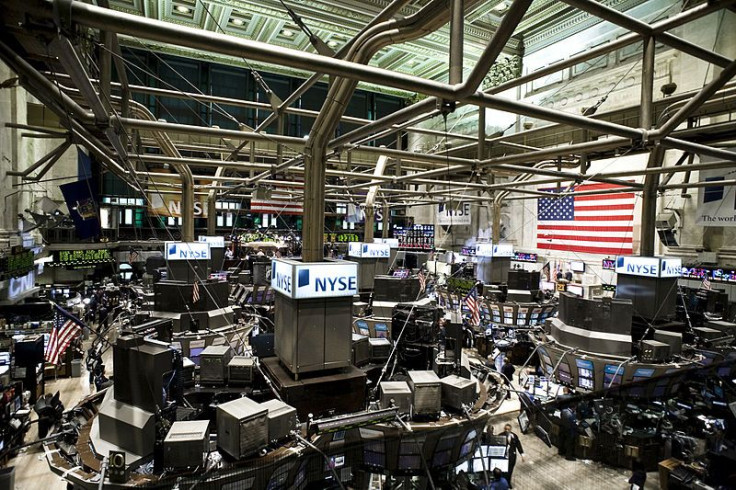Monday's Stock Market Close: US Equities Rise On Continued Optimism Over US-China Trade Deal

KEY POINTS
- Weak PMI data in eurozone did not deter surging European markets
- China reported relatively strong domestic output data for November
- The Dow rose nearly 100 points
U.S. stocks closed higher on Monday on traders’ optimism over the phase one trade deal agreed to by the U.S. and China, including various tariff reductions, although some details of the pact still need to be provided.
The Dow Jones Industrial Average gained 99.62 points to 28,235 while the S&P 500 added 22.64 points to 3,191.464 and the Nasdaq Composite Index rose 79.35 points to 8,814.23.
Volume on the New York Stock Exchange totaled 3 billion shares with 2,063 issues advancing, 222 setting new highs, and 932 declining, with 19 setting new lows.
Active movers were led by Danaher Corp. (DHR), Advanced Micro Devices (AMD), and Amarin (AMRN),
In response to the U.S. decision to postpone a scheduled tariff increase on $160 billion of Chinese goods and to cut some existing tariffs, Beijing said on Sunday it will itself postpone planned tariffs on U.S. automobiles and other goods.
U.S. Trade Representative Robert Lighthizer also said as a result of the phase one trade deal, China will purchase $40 billion of U.S. agricultural products over the next two years.
“There’s a lot to be seen in the weeks and months ahead whether we are going to be able to actually deliver on the phase one deal that we just went through,” Ephie Coumanakos, Concord Financial’s group managing partner, said on Bloomberg TV. “We don’t know all of the specifics.”
Allan von Mehren, analyst at Danske Bank, said: “The most important thing that happened with the phase one deal was that we have moved from a one-year long period of escalation to de-escalation.”
The Chinese government said Monday domestic industrial output grew 6.2% in November from a year ago while retail sales increased 8%.
Oxford Economics raised its 2020 growth forecast for China to 6% from 5.7% “following signs that growth has stabilized.”
In its latest financial stability report, the Bank of England said all of the U.K.'s major banks passed "stress tests" conducted by the central bank this year – a stress test that envisioned a worst case scenario of a hard Brexit.
"The core of the U.K. financial system, including banks, dealers and insurance companies, was resilient to, and prepared for, the wide range of U.K. economic and financial shocks that could be associated with a worst-case disorderly Brexit," the central bank stated.
Mark Carney, the outgoing governor of Bank of England told reporters on Monday the worst case scenario is effectively a no-deal disorderly Brexit. “The probability of that scenario has gone down because of the election results and the intention of the new government,” he said. “But the scenario itself and the risks which we protect the system against has not itself changed. It’s just become less likely.”
“We don’t look to substitute financial policy for climate policy. What we’re looking for management at banks to do is to think through their strategy about their exposure to industries, scale their exposure to industries that could be increasingly and materially exposed to climate risks," said Carney, who is leaving the central bank to take a job as special envoy for climate action and finance at the United Nations.
In the eurozone, the IHS Markit manufacturing purchasing managers index slipped in December to 45.9, a two-month low, while the services purchasing managers index climbed to a four-month high of 52.4 from 51.9.
In Germany, manufacturing purchasing managers index unexpectedly fell to 43.4 in December, while in France it dropped to 50.3. In the U.K., manufacturing purchasing managers index fell to 47.4, a seven-year low.
U.S. services purchasing managers index came in at 52.2 in December versus an expected 52.0. Manufacturing purchasing managers index was 52.5 versus 52.6 expected.
"The surveys bring welcome signs of the economy continuing to regain growth momentum as 2019 draws to a close, with the outlook also brightening to fuel hopes of a strong start to 2020,” said Chris Williamson, chief business economist at IHS Markit. “Business activity, order book and jobs growth all accelerated to five-month highs in December, buoyed by rising domestic sales and further signs of renewed life in export orders.”
The Federal Reserve Bank of New York’s Center for Microeconomic Data found in its latest survey of consumer expectations credit access that the rejection rate for auto loans increased from 4.5% in October 2018 to 8.1% in October 2019.
Overall, the rejection rate for auto loans increased from 6.1% on average in 2018 to 7.1% in 2019.
The New York Fed’s Empire State business conditions index edged up 0.6 points to 3.5 in December, suggesting subdued manufacturing conditions in the state.
Overnight in Asia, markets finished mixed. The Hang Seng dropped 0.65% while Japan’s Nikkei-225 slipped 0.29% and China’s Shanghai Composite climbed 0.56%.
European markets all closed higher with the FTSE 100 surged 2.25% while Germany's DAX rose 0.94% and France's CAC 40 advanced 1.23%.
Crude oil futures gained 0.32% to $60.26 per barrel and Brent crude was up 0.06% at $65.38. Gold futures fell 0.03%.
The euro gained 0.22% at $1.145 while the pound sterling rose 0.09% at $1.3341.
The yield on the 10-year Treasury soared 4.01% to 1.892% while yield on the 30-year Treasury jumped 2.67% to 2.31%.
© Copyright IBTimes 2024. All rights reserved.




















